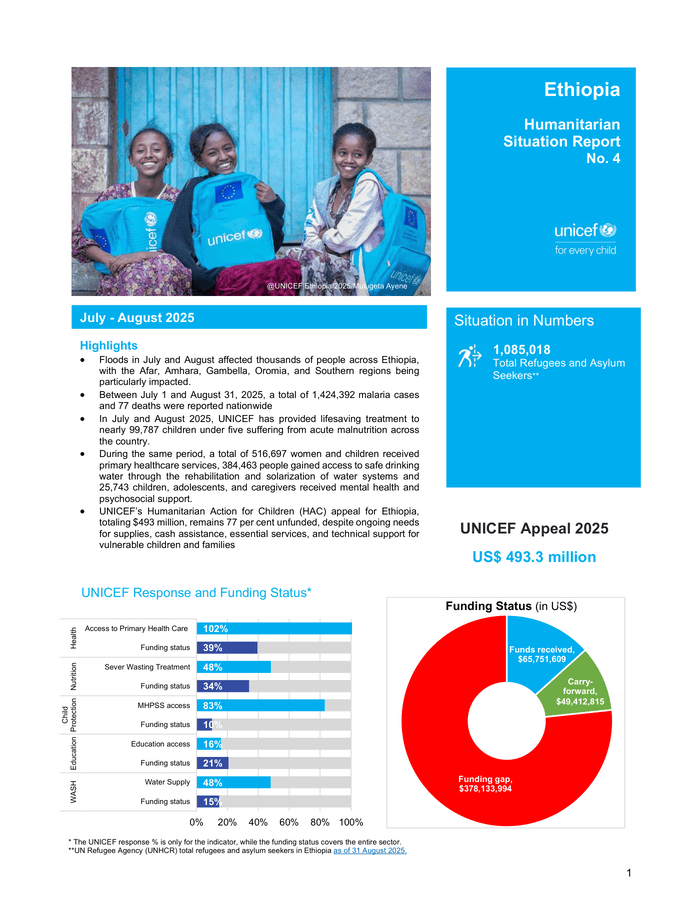UNICEF Releases Humanitarian Situation Report for Ethiopia (July-August 2025)
On October 8, 2025, UNICEF published its latest Humanitarian Situation Report for Ethiopia, detailing critical challenges and ongoing needs faced by vulnerable populations. The report highlights alarming trends exacerbated by recent environmental and health crises.
Impact of Floods and Health Epidemics
Flooding Across Regions
In July and August, severe flooding impacted numerous regions in Ethiopia, including Afar, Amhara, Gambella, Oromia, and the Southern regions, displacing thousands of individuals and disrupting lives. The floods have compounded existing health and humanitarian crises.
Malaria Cases Surge
Between July 1 and August 31, 2025, Ethiopia reported a staggering 1,424,392 malaria cases, resulting in 77 fatalities. This spike in malaria cases indicates a critical public health challenge amid the flooding crisis.
UNICEF’s Response and Humanitarian Efforts
Lifesaving Treatment for Malnutrition
During the reported period, UNICEF provided crucial treatment to nearly 99,787 children under five years old suffering from acute malnutrition. This initiative is vital for safeguarding the health of the youngest members of society.
Primary Healthcare Access
UNICEF also facilitated primary healthcare services to 516,697 women and children, ensuring that essential medical care reached those most in need. These services are essential for disease prevention, maternal health, and child well-being.
Safe Drinking Water Access
Efforts to restore normalcy included rehabilitation and solarization of water systems, providing 384,463 individuals with access to safe drinking water. Ensuring clean water is paramount to reducing health risks compounded by sanitation issues.
Mental Health Support
Recognizing the psychological toll of the crisis, 25,743 children, adolescents, and caregivers were offered mental health and psychosocial support. This initiative helps individuals cope with trauma from natural disasters and health crises.
Unmet Funding Needs
Despite pressing demands, UNICEF’s Humanitarian Action for Children (HAC) appeal, totaling $493 million, remains 77% unfunded. This funding gap limits the organization’s ability to provide essential supplies, cash assistance, and technical support for vulnerable families.
Conclusion
The situation in Ethiopia remains precarious, necessitating urgent financial and logistical support from the international community. As the nation grapples with the effects of floods and a resurgence of malaria, the ongoing humanitarian efforts led by UNICEF are crucial.
For further information, you can access the full UNICEF report here. Keeping abreast of such crises helps raise awareness and supports decisive action to alleviate suffering in affected regions.
For more insights into humanitarian efforts worldwide, visit ReliefWeb and stay informed on global health and disaster response.
